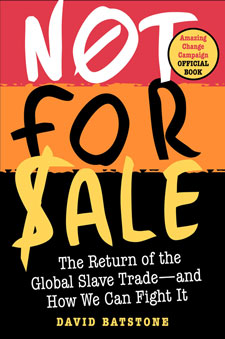Not For Sale by David Batsone aims to give general information about the global slave trade. Batsone is professor of Ethics at San Francisco University and executive editor of Sojourners magazine.
The book contains information about human trafficking worldwide and some horrific case studies of people who have been used, abused, violated and assaulted. It even contains a warning on the book saying that it deals with "mature subject matter".
However, the book is very positive as it tells the stories of modern day heroes who seek to rescue and support the abused.
 Human trafficking generates $31 billion annually and involves 27 million people, half of which are children. In terms of criminal activity it comes third after drug trafficking and the illegal arms trade.
Human trafficking generates $31 billion annually and involves 27 million people, half of which are children. In terms of criminal activity it comes third after drug trafficking and the illegal arms trade.
Most countries in the world are either a source, a transit or a destination for the global slave trade. Widespread poverty and social inequality are reasons why some of this enslavement exists but as Christians we must argue that it's the sinfulness of the human condition that leads sexual exploiters to buy the bodies of one million children.
Three things: poverty, the "John' (buyer of sex) and the trafficker all need to be addressed if the problem is to be decreased.
People have sought to provide work for those they have rescued. Ex-slaves also need protection from vindictive owners, shelter, food and emotional counselling. Often rescuers have received death threats and had their names smeared. There is no point trying to buy people from the exploiters as this only encourages the market to find more people to exploit.
In contrast to more than 200 years ago when slavery was legal, today all countries consider slavery illegal. However, laws are not enforced in every country. Local authorities can be apathetic. There are also delays in court and other abuses of the system.
Prime recruitment zones have changed rapidly. For example, in Europe in 1992 trafficked girls came from Poland and Romania: then in the mid-1990s from Russia, Bulgaria, and now central Asia is a growing source.
Batsone's purpose in writing the book is to stir people to action. He lists numerous occupations and skills that are needed to bring justice and freedom. He wants abolitionists, lawyers, entrepreneurs, construction workers and health professionals to join forces to stop traffickers. His book is positive in that it gives case studies from around the world where action has been taken such as World Vision teaching forgiveness to child soldiers in Uganda, sex workers in Europe being freed, and a jewellery business being set up in Bangkok for young women.
Here are my three guidelines for combating the slave trade.
1. Read Not For Sale. Visit the Not For Sale website and the World Vision website for more information and advice on actions you could take.
2. Pray for Christians who are oppressed and enslaved, that they will have strength to persevere and know God's love. Pray that those who corrupt and abuse and those who willingly sell their children will come to know the gospel and consequently stop what they are doing.
3. Support our CMS missionaries who are directly and indirectly involved in rescuing slaves and preventing abuse as they work in orphanages in Cambodia, assist street people in South Africa and help youth in the Northern Territory. Most importantly we must be telling them the gospel: that God is freeing people from enslavement to sin and giving them eternal life. This must be our greatest desire and hope for all people.



















